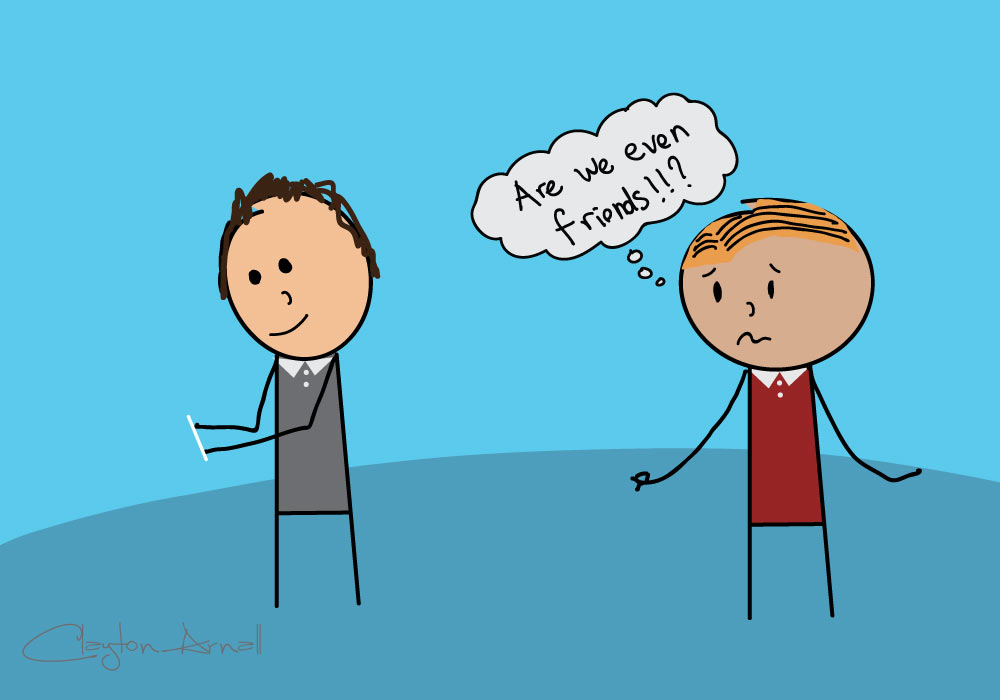
For some of us, friendships can be confusing.
I for one have never had a ton of friends.
Don’t get me wrong, I DO have friends, but my inner circle has always been quite small. It might just be that I’m fairly private person that doesn’t dish a lot about what I’m really thinking until I trust a person.
I also admit though it might just be a perception thing on my part. It’s possible my definition of a friend is different than most other people’s. For example, maybe there’s people out there that consider ME a friend, while I don’t personally have the level of trust necessarily to bump the relationship up to ‘true friend’ status.
Of course, the whole concept of a friend in todays age is a little vague. Within the larger category of ‘FRIEND’, we have everything from best friends, close friends, friend of a friends, childhood friends, new friends, old friends, ex-friends, activity-based friends and you can’t forget Facebook friends. The loosest definition of course being Facebook friends, which pretty much just means anybody you may or may not know or have ever talked to in real life.
It’s obvious we humans are social creatures, longing for true friendship and relationship in many forms.
BUT, we’re also sometimes selfish creatures that WANT things. Sometimes the things we want can be provided by other people.
This is where things can get messy. Friendship and personal needs can sometimes get mixed up. Sometimes it can be hard to tell if a person is pursuing a friendship for the sake of relationship, or for the purpose of getting something else that you have to offer.
And here lies the problem for people like me. And by ‘people like me’, I mean people who can easily sniff out false intentions and manipulation in others.
If a friend needs something, then of course I want to help! That’s what friends are for! However, if somebody needs something and is pursuing a fake friendship to get it, that’s where I’ve traditionally walked away scratching my head. Maybe it’s a personality thing, but that type of behavior doesn’t resonate with me. It’s easy for me to head for the hills at the slightest hint of bad intentions.
Lately however, I’ve decided I don’t want to be the type of person that shuts others out simply because they want or need something from me. I just need a way to notice this up front so that my expectations don’t get squashed and I can correctly ‘classify’ these relationships.
For example, sometimes I assume somebody wants to be friends, only to discover later it’s just a business thing. If somebody only contacts me or has time for me when he or she need something, that’s not friendship, that’s business.
But again, I don’t want to criticize people for this, we all need business relationships! However, what I’ve tried to learn is how to recognize these relationships so I can better estimate what a person wants from me. It also helps me to say ‘no’ easier, which helps protect my time and energy from endless free projects helping ‘friends’.
As a result, I’ve come up with a framework on the types of friendships and relationships I have in my life. This helps me immensely because once I realize which type a given relationship falls into, it can become much easier to manage from an emotional point of view. If that doesn’t make sense, hold on and I’ll explain further as I go here.
Without further ado, here is my very own hair brained theory about friends.
Type 1 Friends: Deep Connection Friendships.
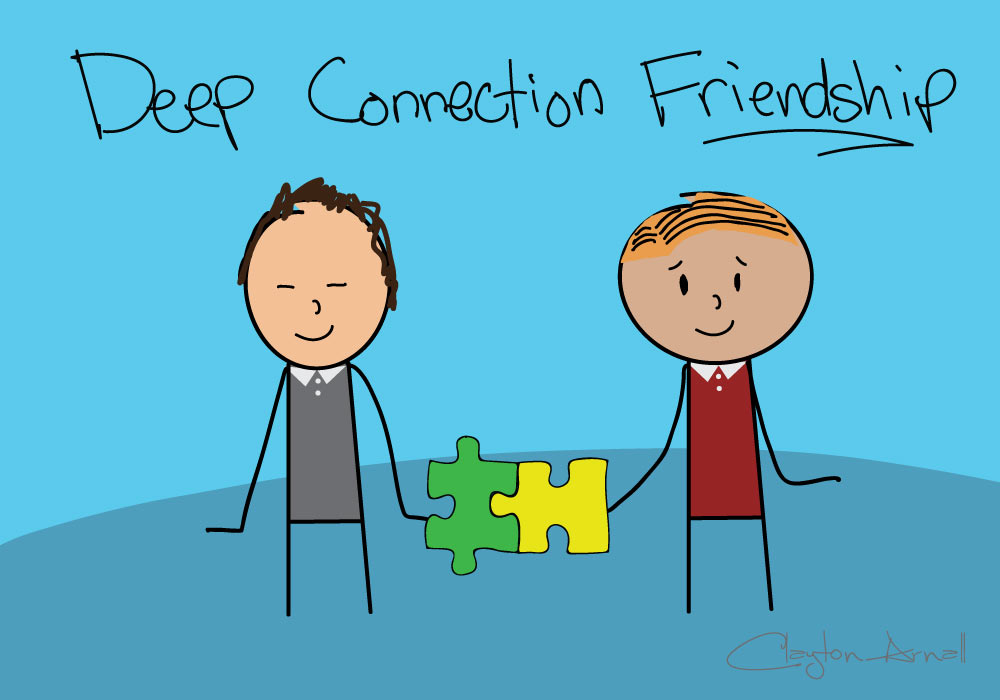
This is the purest and simplest type of friendship. The type everybody wants, but many fail to achieve with more than a few people in their lifetime. Deep connection friendships often feel effortless and simple. This is usually because they are based on a very simple concept. That is, two humans generally deciding they like each other for no particular reason other than they like each other. Nobody is really trying to get something from the other person, other than friendship itself. Sometimes these relationships can start as other types of relationships such as relationships of convinieince, or relationships based on a similar interest, and then build into something deeper. The key is that over time trust develops, which makes these relationships the ones that stand the test of distance and time.
Type 3 Friends: Gimme-Gimme Friends (aka Business Relationships).
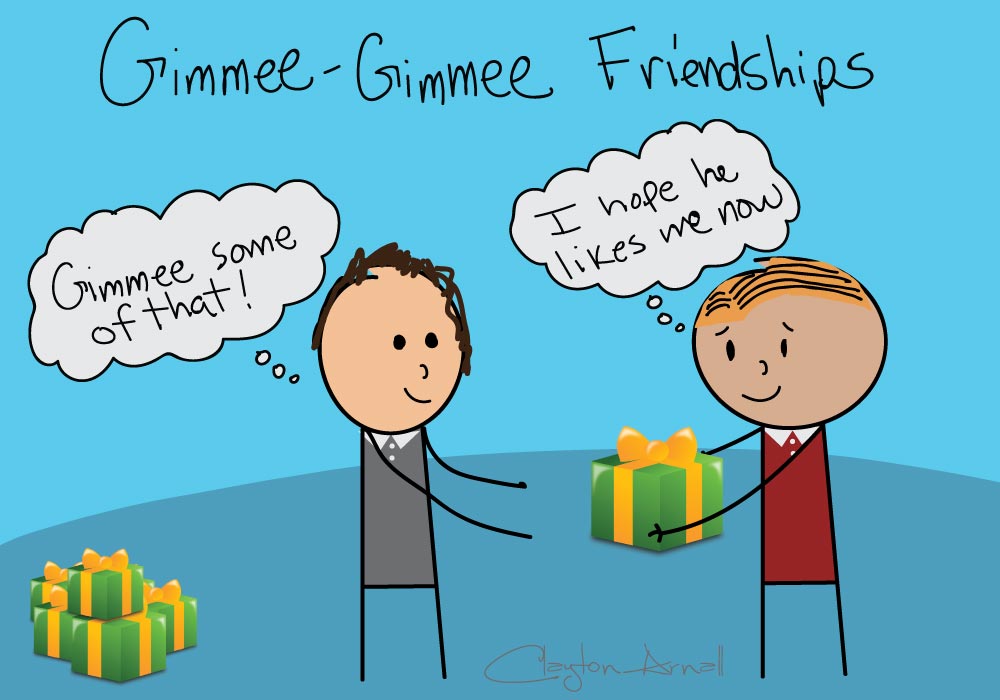
You’re probably wondering why I skipped type 2. Don’t worry, I’ve intentionally skipped it for now. It makes sense to hear type 3 first.
Gimme-Gimme friends are the most confusing type of friendship for the person on ‘giving’ end of the relationship. That’s because Gimme-Gimmes have ulterior motives. It’s not always obvious because Gimme-Gimmes can be good actors. The general goal of a Gimme-Gimme is to strike up a friendship in the hopes of getting something tangible in return.
In many ways, once you actually recognize a relationship as has having Gimme-Gimme qualities, you will quickly realize it’s not really a REAL friendship at all. That’s because it’s actually more of a ‘business relationship’. However, the hard part is actually recognizing it as a Gimme-Gimme Relationship in the first place. That’s because knowing whether somebody is a Gimme-Gimme or not involves knowing that person’s intentions. Like I said above, that can be tough because Gimme-Gimmes can be good actors.
The difference between a Gimme-Gimme Friendship and a standard business relationship is that in the case of a business relationship, it’s very obvious what’s going on and who wants what. For example, when you walk into a store and talk to a friendly salesperson, you can safely assume she’s not trying to establish a long lasting friendship. It’s obvious she’s being nice in order to sell you something. Everybody gets that.
Gimme-Gimme relationships are sort of like this, but sometimes you’re not quite sure if the person is trying to be a legitimate friend, or if she’s pretending to be a friend in order to get something from you.
A Gimme-Gimme’s Goals
What kind of things does a Gimme-Gimme want? It can be anything that you have!
Ask yourself: What do you have to offer other people, that you normally don’t give out freely? It could be something as simple as self assurance and status. Maybe you’re a good looking person with a nice car or a nice home. People like that stuff. It makes people feel good to hang out with other people that have that stuff.
Or maybe the person is just very self conscious and needs constant validation and encouragement from people to feel normal. If you’re a naturally encouraging person, you might know what I’m talking about here. You likely attract these validation-seekers without even trying. To compound the problem, validation-seekers don’t usually recognize their need for validation. They might actually believe they’re pursuing a true friendship when it’s very obvious to everybody else that it’s all about them and their own problems. In extreme cases, these ‘leech’ type relationships can become quite difficult to manage and separate yourself from.
On the flip side, Gimme-Gimmes instead might want access to useful skills, or knowledge that you have that can help in ways of business or life. For example, say you’re a family photographer and somebody that’s starting a ‘Family Lifestyle’ blog all of a sudden wants to be best friends. Maybe it’s genuine, or maybe she just need some free photos.
I for one have always been a fairly ‘handy’ person from a business point of view. I have a bunch of niche skills that other people pay a good amount of money for. It’s a weekly occurrence where somebody is trying to get me to take on some ‘good cause’ as a free project. I generally have a really hard time with this because I’m naturally an empathetic person. I really do want to help all these people. But at the same time, I’ve learned that I can’t do everything for everybody. There simply isn’t enough time! Plus, if I give all my time away, I don’t have time for the things that are really important.
How to Recognize a Gimme-Gimme
Once you suspect a person of being a Gimme-Gimme, it’s not actually that hard to confirm or squash your suspicions. For one, Gimme-Gimmes only contact you when they need something. They don’t usually call just to see how you’re doing. Instead, they’ll PRETEND to call to see how you’re doing, and then after a few minutes will cut to the chase and dive into what they need.
Another popular tactic of a Gimme-Gimme is to drastically simplify all communication once the initial relationship is established. Whereas good friends will often want to meet up in real life, or talk on the phone now and then to catch up, Gimme-Gimmes sometimes push the relationship into a 100% text based dialog, and then refuse to take things further.
For example, a Gimme-Gimme might text you a question or problem he’s looking for advice on. If you say something like ‘Hey why don’t you give me a call and we can chat about it’, often times he will pretend to be busy at that particular moment, but will offer to try to call later. Apart from the obvious contradiction of having plenty of time to text a complicated question or problem, but zero time to talk on the phone, most of the time you’ll never receive that call.
I personally know a few Gimme-Gimmes that will maintain a large list of contacts with various types of influence or expertise. Then when they need some help answering a question or need some quick advice, they’ll send the same message to multiple people just to see what kind of helpful responses they’ll get back. When you look at it this way, the ‘no time for a phone call’ makes perfect sense. They’re throwing things at walls to see what will stick.
You’re the thing being thrown at the wall.
The Flip Side of a Gimme-Gimme Friendship
I should now clarify that the point of recognizing a Gimme-Gimme isn’t so that you can necessarily cut the Gimme-Gimme off and isolate yourself. It’s very possible that a person like this might be a great business or networking relationship for you. Even though this person might want something from you, maybe he or she has something valuable to give you in return. Even if there’s no chance of a real friendship here, it still doesn’t mean it can’t be an encouraging business transaction. And by transaction, I don’t necessarily mean money. It could also be a form of ‘I scratch your back, you scratch mine’. A transfer of skills, knowledge, things, encouragement etc.
Basically, it’s completely fine to have a RELATIONSHIP with a person without having a FRIENDSHIP. To be in relationship means you might have regular interactions, business dealings, or even conversations that could be interpreted as ‘friendly’. However, this is still different than real friendship, which takes things deeper.
Here’s the key though. Don’t expect a person like this to do things, or behave in ways that Deep Connection Friends would behave. A Gimme-Gimme will never behave that way, so don’t expect it!
This can end up saving you a lot of confusion down the road, especially if you’re the type of person that longs for deeper friendships. If you have a Gimme-Gimme seeking a relationship with you, it’s important to realize it up front so you’re not left wondering why this person isn’t reciprocating your attempts at real friendship!
I REPEAT, don’t expect a deep friendship out of a Gimme-Gimme relationship!
Type 2 Friends: Conditional Friends.
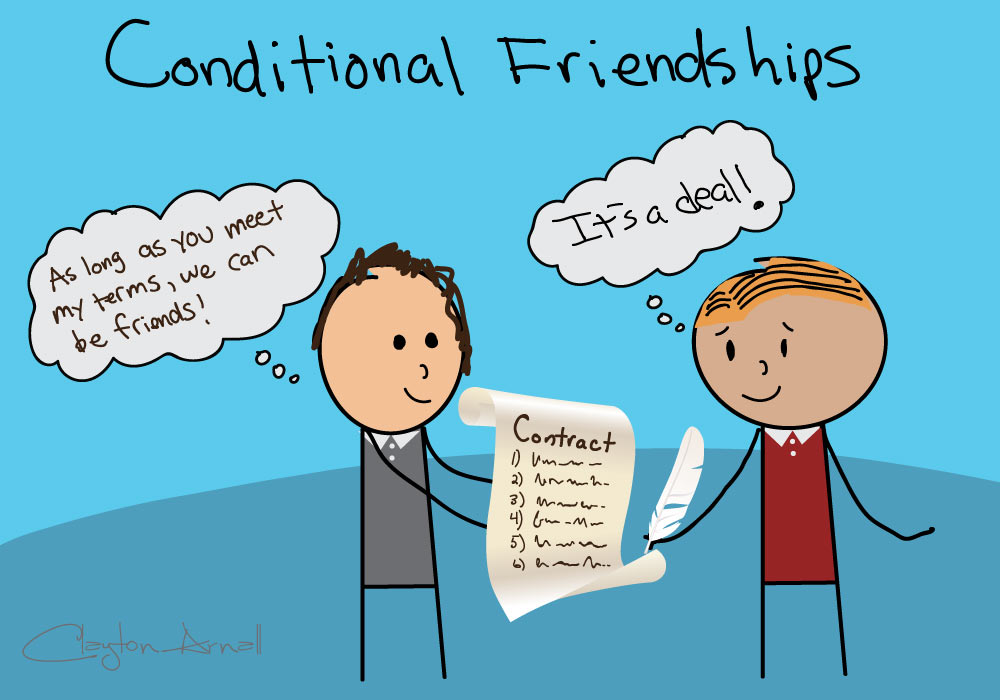
Conditional Friendships are a mixture of Type1 Deep Connection Friendships and type 3 Gimme-Gimme Friendships. This is where the vast majority of relationships lie. You ARE friends, but there’s CONDITIONS. Most of the time people don’t like to admit that the conditions actually exist. But if you look closely, you’ll usually find them clear as day. Sadly even many marriages fall into this category.
How do you know whether a friendship is a Deep Connection or a Conditional Friendship? With a Conditional Friendship, the word IF is always attached to some kind of substantial condition. For example, I’ll be your friend IF you say the right things to me and validate me. Or, I’ll be your friend IF you dress a certain way / talk a certain way / behave a certain way / do a certain things for me / share and believe in my religion / remain successful / do certain activities that I like to do / work at the same company as me etc.
This is different from a Type 1 relationship where the only if is ‘I’ll be your friend if you be my friend’. Type 2 friendships take that one step further to more tangible and practical conditions.
Convenience Based Friendships
Sometimes the ‘IF’ in a type 2 friendship can be convenience itself. I’ll be your friend IF it’s easy and convenient. Many work, school, sports, or club relationships are like this. For example, two people may have actually started as and moved past a type 3 Gimme-Gimme relationship where they simply needed each other to do a certain sport or activity. Now they’re beginning to take a genuine interest in each other apart from the activity itself. However, the ‘if it’s convenient’ condition likely still exists. That’s why if one of them moves jobs, finishes school, stops playing the sport or going to the club meetings, they will often fall out of touch with these friendships.
After these relationships have fallen out of touch, they may see each other once in a while, but the connection has faded into ‘acquaintances’ or ‘old friends’.
Problems with Type 2 Friendships
Here’s the big problem with type 2 friends. It’s hard to read the intentions behind the actions. In other words, it’s hard to know WHY somebody is doing what he or she’s doing. For example, say you want to value somebody as a Type 1 Deep Connection Friend. It can sometimes be hard to fully know whether this person feels the same way back. Does she truly value you for you? Or is she trying to get something from you? Or maybe she’s just being lazy and will take what she can get as long as it doesn’t take much work, like in the case of a convenience based relationship.
In other words, is this type 2 friendship leaning towards a type 1 or type 3? The only way to really know is to subtly test the relationship by removing the ‘perks’ that the other person might value as the basis for the relationship. If you remove a perk or two, is he still engaged? Then you might have a real type 2 or type 1 friend there. If he hits the road, then you’ve probably just unconvered a Gimme-Gimme or a relationship based on convenience. If you remove even more conditions and the relationship doesn’t fizzle away into nothing, then you might even know it’s a real deep connection friendship.
One-Sided Relationships
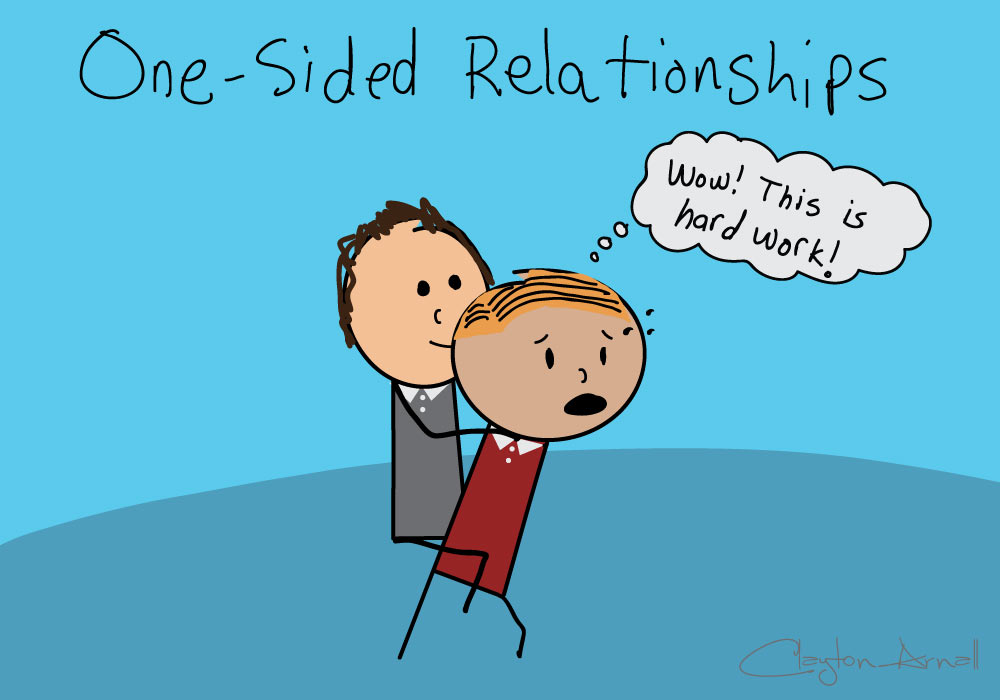
A one-sided relationship can form when two people are stuck on two different different levels of friendship.
For example, say Adriana really appreciates and wants Emma as a Type 1 Deep Connection Friend. Emma on the other hand finds Adriana nice and enjoys spending time with her, but mainly when she needs somebody to go mountain biking with.
Adriana is trying to move the relationship to a type 1 Deep Connection Friendship, while Emma is fine at type 2 with Adriana as a decent friend she can do activities with.
If Adriana doesn’t quickly realize that Emma is not looking for that same Deep Connection Friendship, she will eventually end up getting frustrated and hurt because Emma will never reciprocate. For example, say Adriana wants to meet up outside of mountain biking and Adriana doesn’t really want to. To avoid hurting her feelings, Adriana makes up excuses to subtly blow her off. She’s ‘busy’. This could eventually spiral out of control if Adriana decides she has the right to get Angry with Emma for not reciprocating the friendship.
However, even though Emma is the one blowing Adriana off, the breakdown is not Emma’s fault! It’s Adriana’s. She needs to learn how to better read her relationships so as not to form unrealistic expectations. Is it unfortunate she can’t have the deep connection relationship she wants? Of course it is! However, she should never feel like she DESERVES it. Feeling deserving of something that you shouldn’t is a narcissistic quality that only serves to destroy friendships instead of build them up.
What’s the best way to detect a one-sided relationship? Again, you have to test the relationship. What if you stop contacting the person for a week or two. Does SHE initiate a new conversations or meet up instead? If yes, then you can rest assured that you’re on the way to building a real friendship. However, if after you stop initializing for a month or two and all you hear are crickets, either she has just gone on an extended vacation or you might be in a one-sided relationship where you’re the only one interested. Further investigation and thought might be needed at that point.
What’s the Point of all this?
The point is… it’s all about expectations and not having them dashed. I see it around me constantly. Even in family relationships. People put expectations on each other, and then eventually get angry when those expectations are not met. Most of the time it’s because people are expecting reciprocating friendship from a person that’s stuck on a different friendship level.
Anger is never the right response. Most of the time it will do the exact opposite of what you want. It will push the person further away. Anger destroys trust. Relationships ARE trust. There is no such thing as a friendship that doesn’t have trust.
If you notice that you want a friendship that the other person doesn’t appear to want, you have two choices:
1) Keep working at it. Don’t get angry at the other person. Instead, show the person kindness, grace and patience. These are the qualities that build friendships! Anger is the emotion of judgement, which always breaks things down.
2) If you feel like the other person is never going to step up to the plate and reciprocate the friendship, there’s no shame in pulling back a bit. Maybe this person would make a great casual friend, or ‘business’ relationship. At this point, instead of wasting more energy trying to get something that’s just not likely to happen, just relax. Start looking elsewhere.
Just like with romantic relationships, there’s plenty of other fish in the sea. BUT unlike romantic relationships, you’re free to move around and be friends with as many people at once as you like. So get out there and make some new friends 🙂